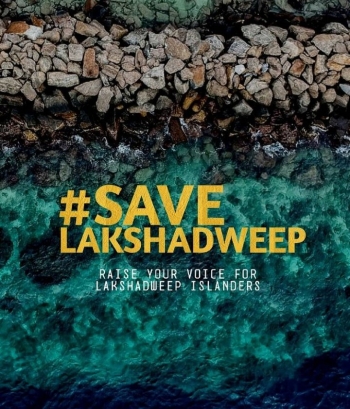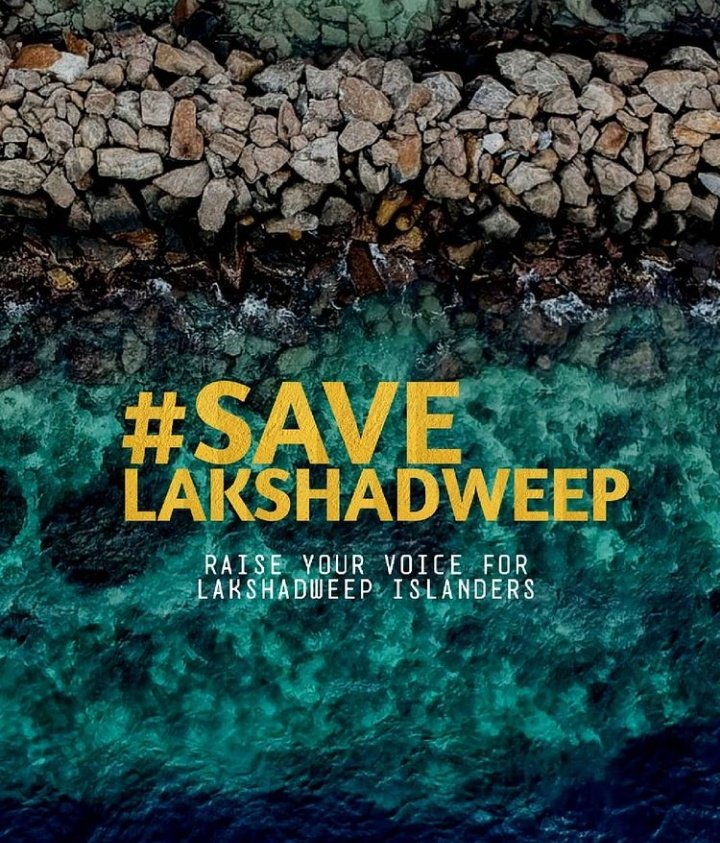
.png) Joseph Maliakan
Joseph Maliakan

No people in independent India have faced such blatant and mindless state terror as the inhabitants of the tiny Lakshadweep islands have been facing since the arrival of the new Administrator, Praful Khoda Patel, to the Union Territory in December 2020. The people have been so terrorized that several former Administrators of the Union Territory have compared it to 1975 emergency.
The new Administrator has, during the last five months, taken a series of draconian, seemingly illegal and negative steps that the peace and tranquility of the placid waters of the Lakshadweep islands have been hugely disturbed.
Patel has closed anganwadis, sacked dozens of employees who have been working for decades, banned meat from school mid-day meals, demolished dozens of sheds of fishermen that were built as per integrated scientific plan prepared by the Supreme Court appointed committee, brought in Goondas Act in a territory that has not known any major crime in the recent years.
He has wound up dairy farms, amended Panchayati Raj rules as per his whims, and tinkered with PWD contracts. The most disturbing of all are the provisions of the draft Lakshadweep Development Regulations 2021.
Umesh Saighal who was the Administrator of the Union Territory from 1982 to 1985, and who has directed two documentaries and written a book on the islands has in a letter to Union Home Minister Amit Shah pointed out that some of the provisions of the draft development programme are laughable and not tailor-made for the island territory but straight away picked up from the provisions for a city like Delhi.
“It talks about orderly and progressive development of urban and rural areas. There are no urban areas in the archipelago and the largest island has a population of only 12,000. The draft envisages additional power for acquisition of land; almost all the ten islands are abadi areas where land cannot be acquired. It talks about development of towns and countryside. Such words can only be used by a person who has never been to the islands,” says Umesh Saighal. There are many more such howlers like “cultivation of soil” when 99 percent of the islands are formed by sand!
The panchayat notification where a person with more than two children is disqualified from being a member is not only discriminatory but also violative of the 74th amendment to the Constitution of India.
So what exactly is the problem? The basic problem is that the majority of the tinny population (70,000) of the islands is Muslims (96 per cent) who have been leading a peaceful and fruitful life fighting very severe climate and their lives have to be unsettled.
Otherwise there is no logic whatsoever for the Modi government to appoint a Gujarati politician who was at one time a Home Minister in the state as the Administrator of Lakshadweep over-riding tradition. To hide the real intent of persecuting the Muslim population of the Islands, the entire project has been described as a great enterprise to make Lakshadweep another Maldives.
Replying to criticism of his negative steps, Patel claimed that the Lakshadweep Development Authority Regulation will usher in development and will go a long way in improving the social and economic indicators of the islands. Patel further said: “These islands are similar to Maldives and we want to develop them on similar lines. We want to develop sustainable infrastructure and promote sustainable tourism.”
Either Patel or the people who advise him are completely ignorant about the Lakshadweep islands, its people, and their culture; or else their agenda is very sinister. It is very difficult to believe that Patel who is born and brought up in the coastal state of Gujarat is unaware of the ecosystem of Lakshadweep.
An average 10th class student who has taken his basic geography lessons will know that Lakshadweep cannot be compared to the Maldives. Both are in the Arabian Sea and face the prospect of submergence due to rising sea level caused by climate change. And no power on earth can convert the Lakshadweep islands into tourist resorts like the Maldives.
Lakshadweep consists of 36 islands of which only 10 are populated. Maldives consists of 1190 islands of which more than 1000 are not populated; close to 200 islands are exclusive tourist resorts. Lakshadweep goes through violent monsoons every year while the sea around the Maldives is not so violent. Further tourism potential of the Lakshadweep Islands is already saturated; more tourist resorts will only lead to environmental degradation.
The new Administrator has grand plans to resettle the people of Lakshadweep which has the highest population density of 2,000 per square kilometer in the country. Where will the people be resettled, in the sea?